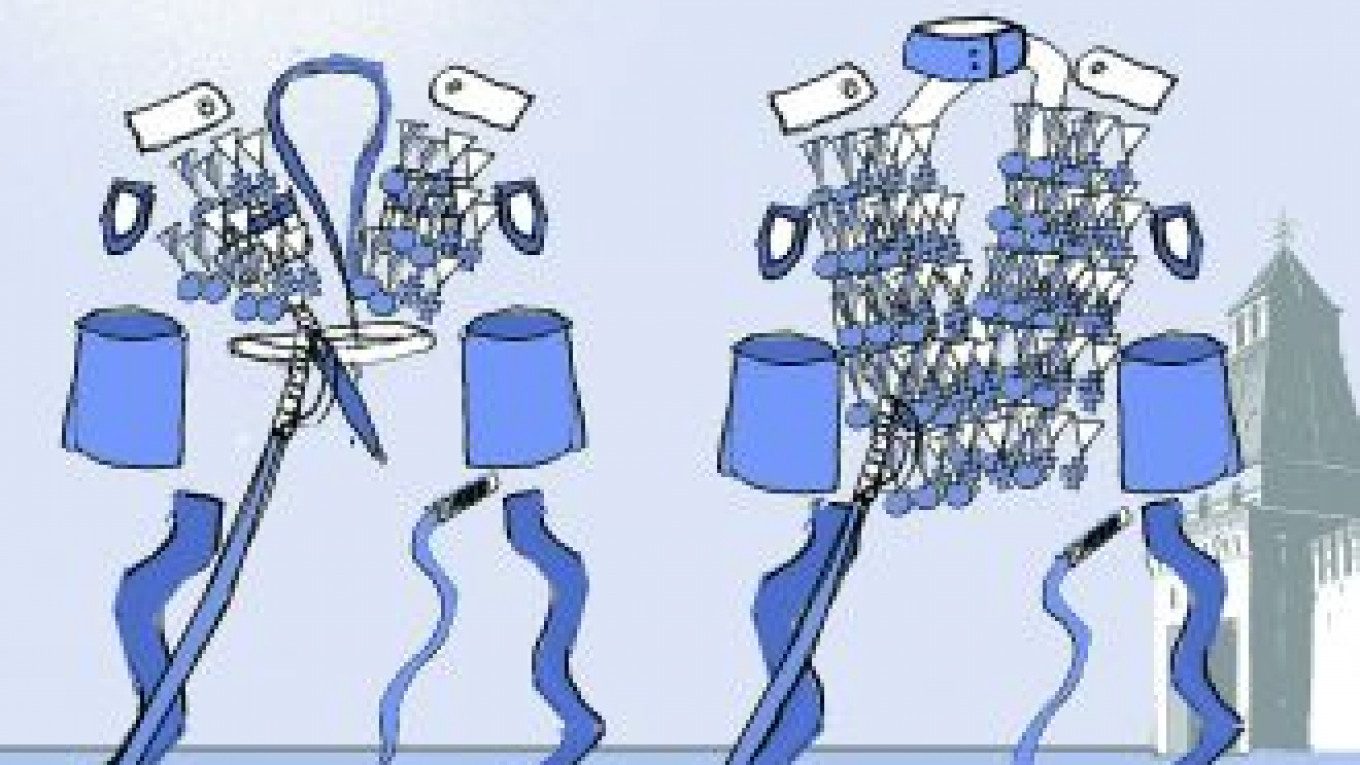Muscovites have been treated to a new sight in recent weeks: Cossacks have been patrolling many streets in the center, trying to rid the city of criminals.
They consider themselves to be descendents of the original Cossacks, the military class of imperial Russia. Dozens of men wearing striped trousers and peaked caps walk around the city center harassing citizens and interpreting the law in their own way. The problem is that the law does not give Cossacks the right to act as de facto police officers.
The Kremlin is trying to find ways to include the Cossack community in the existing vertical power system. Two years ago, decrees were signed giving "registered Cossack troops" — those who claim to be descended from Cossacks — their own coat of arms, banners, uniforms and rank and also special ID cards that look like those issued to military personnel. The president appoints their 10 generals, the chieftains of the Cossack troops, and the presidential envoys to the districts appoint the senior Cossack officers. It seems that the Kremlin is trying to repay the Cossacks for the repression they suffered during the civil war from 1917-23 and the forced collectivization campaign under Josef Stalin.
Ever since the 1990s, the Russian government has been trying to figure out how it can help the Cossacks build a community with special privileges. This contradiction is clearly evident in Russian law, which states that "the Cossack community is a voluntary association of citizens of the Russian Federation, a nonprofit organization … whose members, in a prescribed manner, commit to performing state or other service." That is, Cossacks are defined as a type of voluntary nonprofit organization, while at the same time they are committed to fulfilling "state service."
It seems like a no-brainer for the Kremlin. All it needs to do is form military units with people who identify themselves as Cossacks, especially when the army is experiencing a serious shortage of soldiers. In reality, 15 Cossack units existed for 10 years in the army, but two years ago, 13 of them were disbanded for the simple reason that not a single Cossack served in any of them.
The list of so-called Cossack units that were eliminated includes the motorized Siberian Cossack Regiment of the 85th Infantry Division in Novorossiisk, the Cossack unit of the 122nd Infantry Division in Borzia in the Zabaikalsy region and the 128th Machine Artillery Division in the Jewish autonomous district. Former General Staff head Nikolai Makarov said that in the region of the great Don Cossacks, about 30,000 men came of military age, of whom only 1,800 were actually enrolled in the ranks of the army. That was 30 percent more than joined before. In 2010, a Defense Ministry source told Interfax that the number of actual Cossacks in the so-called Cossack units "was not more than 2 percent, and in a number of subunits, not a single Cossack was serving."
As it turns out, the Cossacks are willing to patrol Moscow streets, but they refuse to perform their main historical function: serving in the armed forces. In reality, Cossacks are no different from the rest of the population. All the talk that Cossacks represent generations of pedigreed fighters imbued with a burning desire to defend the motherland is nonsense.
As for "state service," the Cossack community has shown a clear interest in signing contracts with local authorities to uphold public order or protecting nature reserves. Translated into modern-day Russian, this may mean they want to run a racket collecting bribes from criminals or illegal businesses. In this way, Russian authorities are hoping that they can gain a loyal quasi-police force that can help break up street protests, while at the same time using them to pad the numbers for army recruits and officers. In short, the Kremlin wants to incorporate an invented "elite" group of Russians into the siloviki.
I suspect that the patrols of Moscow streets by fake Cossacks is just the first step toward their control over such profitable sectors as collection of parking fees in the city center. Don't be surpised if the "Kubansksaya gang" or "Donskaya gang," referring to the centers of Cossack culture in the Rostov and Krasnodar regions, become as recognizable as the other famous Russian organized crime groups, such as the Tambov or Orekhovskaya gangs.
Alexander Golts is deputy editor of the online newspaper Yezhednevny Zhurnal.
Related articles:
A Message from The Moscow Times:
Dear readers,
We are facing unprecedented challenges. Russia's Prosecutor General's Office has designated The Moscow Times as an "undesirable" organization, criminalizing our work and putting our staff at risk of prosecution. This follows our earlier unjust labeling as a "foreign agent."
These actions are direct attempts to silence independent journalism in Russia. The authorities claim our work "discredits the decisions of the Russian leadership." We see things differently: we strive to provide accurate, unbiased reporting on Russia.
We, the journalists of The Moscow Times, refuse to be silenced. But to continue our work, we need your help.
Your support, no matter how small, makes a world of difference. If you can, please support us monthly starting from just $2. It's quick to set up, and every contribution makes a significant impact.
By supporting The Moscow Times, you're defending open, independent journalism in the face of repression. Thank you for standing with us.
Remind me later.







